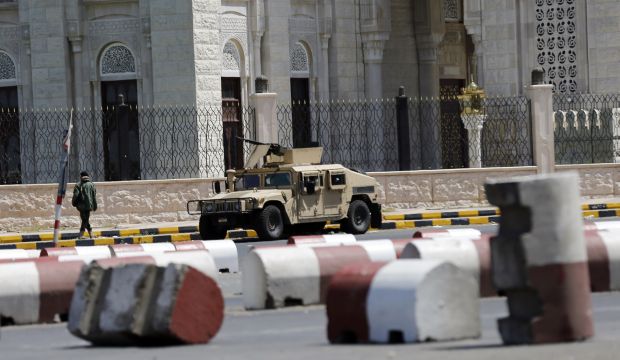
A road leading to the Presidential Palace is blocked with concrete barricades and a military vehicle in Sana’a, Yemen, on October 11, 2014. (Reuters/Khaled Abdullah)
Sana’a, Asharq Al-Awsat—Five new names are being put forward to become Yemen’s new prime minister, sources told Asharq Al-Awsat on Saturday, as meetings continue between Yemeni President Abd Rabbuh Mansur Hadi and the Houthi movement to find a political solution to the crisis currently engulfing the country.
The sources said the most prominent of the names put forward were veteran politicians Yahya Hussein Al-Arshi and Ahmed Luqman, both of whom have occupied a number of ministerial positions over the last few decades. Other candidates have been put forward by the Houthis, but the sources said these had been vetoed by representatives of other Yemeni political factions attending the meetings.
There were also disagreements regarding other major positions in the cabinet, the sources said.
“[There are] problems regarding choosing ministers for the major portfolios, in addition to popular rejection of the [idea of] the minister of education being a Houthi, over fears the educational curriculum will be changed to match the goals of the group while parliament is still not in session,” one of them told Asharq Al-Awsat.
Senior political sources, who spoke on condition of anonymity as they were not authorized to brief the media, told Asharq Al-Awsat the meetings were also attended by representatives of the 10 countries of the Gulf Initiative—the backers of the 2011 accord underpinning behind Yemen’s current political transition—which include the five permanent members of the UN Security Council and the five members of the Gulf Cooperation Council (GCC).
Meanwhile, sources from the secessionist Al-Hirak movement, which is based in the south of Yemen, told Asharq Al-Awsat that Houthi rebels broke into the home of the security and military adviser to President Hadi, Brig. Gen. Mohsin Al-Ahmar, in the city of Al-Hudaydah during the early hours of Saturday. Houthi rebels also stormed into Ahmar’s home in Sana’a after their takeover of the capital on September 20.
Eyewitnesses said they saw a “large number” of Houthi rebels enter Hudaydah city in an attempt to take over a number of official buildings, including the historic Corniche Citadel building, from which the sources said they were later forced out by members of Al-Hirak.
Meanwhile, the UN Security Council condemned late on Friday the recent violence in the country. It called on all parties to work implement fully all terms of the recent UN-brokered peace deal signed between the Houthis and President Hadi, and for the group to hand over all weapons seized during their takeover of the capital back to the authorities.
The Shi’ite Houthi movement took control of the capital Sana’a on September 20 following a month-long series of mass protests by its members, demanding the formation of a new government and the reinstatement of fuel subsidies. The Houthis claim they are “continuing” Yemen’s revolution which toppled former President Ali Abdullah Saleh, but critics, including President Hadi, have accused the group of implementing “foreign agendas,” usually assumed to mean Iran.
The group has also increasingly been the target of attacks by Al-Qaeda in the Arabian Peninsula, which claimed responsibility for a suicide bombing in Sana’a last Thursday that killed almost 50 people.
Hamdan Al-Rahbi contributed reporting from Sana’a

Trackbacks/Pingbacks